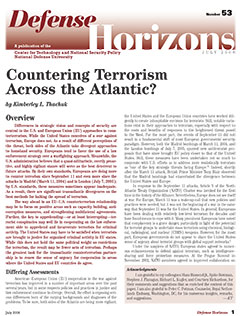DOWNLOAD PDF
 Overview
Overview
Differences in strategic vision and concepts of security are central to the U.S. and European Union (EU) approaches to counterterrorism. While the United States conceives of a war against terrorism, Europe does not. As a result of different perceptions of the threat, both sides of the Atlantic take divergent approaches to homeland security. Europeans tend to favor the use of a law enforcement strategy over a warfighting approach. Meanwhile, the U.S. administration believes that a quasi-militaristic, overtly proactive, and highly vigilant stance will serve as the best deterrent to future attacks. By their own standards, Europeans are doing more to counter terrorism since September 11 and even more since the attacks in Madrid (March 11, 2004) and in London (July 7, 2005); by U.S. standards, these measures sometimes appear inadequate. As a result, there are significant transatlantic divergences on the best methods for halting the spread of terrorism.
The way ahead in an EU–U.S. counterterrorism relationship may be to focus on positive areas such as capacity building, anticorruption measures, and strengthening multilateral agreements. Further, the key to apprehending—or at least interrupting—terrorist conspiracies may well lie in cooperating on the law enforcement side to apprehend and incarcerate terrorists for criminal activity. The United States may have to be satisfied when terrorists are brought to justice for organized criminal activity in EU states. While this does not hold the same political weight as convictions for terrorism, the result may be fewer acts of terrorism. Perhaps the greatest task for the transatlantic counterterrorism partnership is to renew the sense of urgency for cooperation in areas where the United States and EU countries do agree.
READ MORE >>